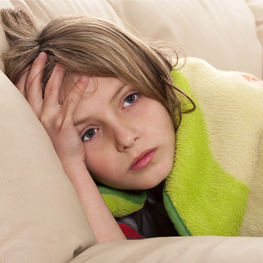
When a child comes home from school with the sniffles, parents push fluids, fire up the chicken soup and watch for a fever. Most of us can even predict an illness before it strikes based on the appearance of our little ones. Just last night I caught a glimpse of dark circles forming under my daughter’s eyes and thought: An asthma attack is on its way.
Parents are conditioned to look for signs of illness (particularly during cold and flu season) and do everything we can to prevent illness from entering our homes. We stock up on vitamins, fill the fridge with fresh fruits and vegetables, and make sure everyone drinks plenty of water. But how often do we stop to consider how the emotional health of the child affects the physical health of the child?
The truth is that stress, anxiety and symptoms of depression can lead to various physical complaints and make kids more prone to illness. Poor emotional health weakens the immune system of the child, and that leads to increased absences at school.
What to look for
All kids are different, so it’s important to tune into each child’s patterns of behavior, but there are a few psychosomatic complaints that tend to manifest in young children experiencing stress and anxiety:
Stomachaches
Headaches
Sleep disturbance (sleeping too much or too little and/or frequent nightmares)
Fatigue
Muscle tension or muscle pain
Changes in eating habits (eating too much or eating too little)
Frequent colds/viruses
Common triggers of childhood stress and anxiety
Personality plays a big role in how kids process and cope with stress. Some kids verbalize their feelings constantly and put their emotions out there, while others internalize their feelings. While some kids can appear to be more naturally resilient than others, all kids can learn how to pick themselves up when they fall.
Empowering kids to identify and understand their stress triggers helps them build coping strategies that work. It helps to describe what stress feels like and provide an example of your own stress triggers to get kids talking.
In general, many kids experience stress and anxiety in response to some of these triggers:
Academic demands
Over-scheduling
Social stress (difficulty making and
keeping friends)
Transitions (new home, new school, new
teacher, etc.)
Divorce
Family discord
Illness in the family
Loss
How to help your child cope with stress
It’s important to get back to basics when helping kids learn to manage stress and anxiety. We live in a busy world and kids today are often on the go. When we don’t slow down, kids can struggle to maintain optimal emotional health and that can lead to physical illness.
Try a few of these strategies to keep your kids happy and healthy this winter:
Prioritize sleep. Sleep is essential for children! They need to recharge their batteries each night. Aim for 10 hours per night for school-age children.
Make healthy choices. The winter season often means parties galore and lots of treats. Focus on balanced nutrition as much as possible to keep kids healthy.
Teach relaxation strategies. Life can be overwhelming, even when you’re little. Teach kids to cope with stress and anxiety by using progressive muscle relaxation and guided imagery.
Put a stress ball in the backpack. A stress ball is a great tool for stress relief on the go, particularly during a hard day at school.
Talk about emotions. We always ask our kids about their day, but we should be asking how they feel. The best way to help kids learn to manage and cope with emotions is to make ‘feelings conversations’ part of everyday conversation. Start the conversation with, “What made you feel happy today?” Then shift to what was something frustrating and go on from there. When we talk openly about emotions, we empower our kids to do the same.
For more strategies to target childhood stress and raise happy kids, check out Katie’s new book, The Happy Kid Handbook: How to Raise Joyful Children in a Stressful World, amazon.ca.
Katie Hurley, LCSW, is a child and adolescent psychotherapist and writer. Katie is the author of The Happy Kid Handbook: How to Raise Joyful Children in a Stressful World. Her work can be found on PBS Parents, Momtastic, mom.me and Yahoo Parenting.
Calgary’s Child Magazine © 2024 Calgary’s Child